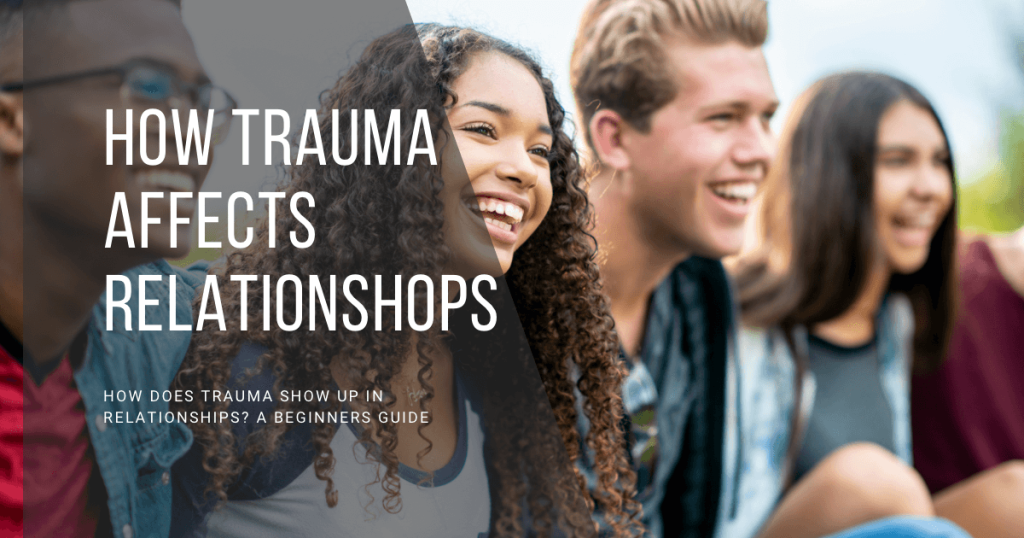There’s really no way around it: trauma has a powerful effect on our relationships, both with family and friends to romantic partners.
When trauma is left unaddressed, it can lead to attachment styles that are unhealthy for all parties involved. These negative attachment styles can often involve codependency, which can further distort the way trauma is expressed in the relationship.
It is essential that trauma is confronted on a personal level as well as in the context of your relationships to make sure these patterns don’t become repeated roadblocks in building healthy connections.
Stick around so you, too, can learn how to recognize symptoms of trauma and understand how it may be manifesting in your daily life. You never know, it may just be the missing puzzle piece you need in order to make positive changes.
What Is Trauma?
Before we dive into how trauma may be impacting your relationships, it’s crucial we get on the same page about what trauma actually is.
Trauma is the collective term for unsettling emotional distress caused either by first hand experiences or witnessed events throughout one’s life.
There are many ways in which trauma can occur. It can be caused by violence or injury, such as rape or assault, or psychological strain from any kind of ongoing situation involving chaos and danger.
The aftermath of trauma can manifest in both psychologically disabling symptoms, including flashbacks and emotional numbing, as well as physical symptoms such as insomnia and digestive problems.
Put simply, trauma occurs when our sense of safety is violated – whether that be through physical harm, emotional trauma, financial stressors, medical emergencies or more.
Childhood Trauma:
Childhood trauma can have profound and far-reaching effects on an individual.
Often, childhood trauma is associated with physical, sexual or emotional abuse, neglect, and/or abandonment.
It is believed that children are particularly vulnerable to trauma due to the stage of their lives – they may not yet possess the maturity or understanding needed to cope with the trauma they experience, leading them to feel overwhelmed.
In this context trauma can follow us into adulthood, creating ongoing struggles with stress, depression, anxiety, self-doubt and you guessed it – relationships.
Can Trauma Impact Your Ability To Love?
Trauma can be truly debilitating and sometimes, it even has the ability to reveal itself in unexpected areas – such as our relationships.
It’s true, trauma can have a profound effect on your capacity to love, making you wary of closeness with others. This can make committing to relationships – whether that’s romantically or platonically – incredibly challenging.
It also means that trauma survivors may find themselves unable to open up and trust in the same way they were once able to. While trauma may try its best to influence us, with awareness and support, we can still try to make room for the love we need in life.
5 Ways Trauma Can Affect Your Romantic Relationships:
Many of us have trauma stored away, whether we recognize it or not, and that trauma has the ability to reshape our romantic relationships.
Oftentimes trauma can lead to difficulties when it comes to intimacy and connection with our partners.
It can be difficult to navigate those areas of the relationship when we have trauma-induced walls we have put up, but fortunately there are resources out there to help us develop healthier connections.
Let’s talk about 5 ways trauma can affect your romantic relationships, whether you realize it or not!
Trauma Alters The Way We Think About Others:
Trauma can have a devastating, long-term effect on our romantic relationships by changing how we think about ourselves, our partners, and even our world around us.
When we endure trauma, it can really disrupt the way we view our place in things or the ability to trust the people closest to us.
Even the most minor trauma can make us wary of trusting anyone for fear of another betrayal or hurtful experience.
This trauma reshapes how we interact with those around us, especially in regards to intimate relationships. In some cases, we may attempt to push our partner away in the name of self-protection.
On the other hand, however, we may start relying too much on our partner for emotional comfort. This may happen when trauma makes us feel like everyone else is out to get us and no one understands what we’re going through.
Trauma Puts Us In a Paranoid Frame Of Mind:
Experiencing trauma can have a lasting impact on our romantic relationships by initiating a never-ending state of fight or flight within us.
When trauma is experienced, it can enter into a person’s subconscious and linger within them. This lingering trauma can cause those who have gone through trauma to become so hyper aroused that they are in constant fear, even when the danger has long since passed.
This means that all their loved one’s actions, regardless of how benign they may seem, may be interpreted as threatening or malicious due to their overactive paranoia brought about by trauma.
Ultimately, trauma has such an impact on romantic relationships because it causes lovers to be ever vigilant and distrusting towards one another – a situation which cannot prove fruitful for either partner if sustained for too long.
Trauma Can Cause Us To Emotionally Detach:
When the aftermath of trauma hits, whether from childhood abuse or intense, long-term trauma, our brain’s natural response is to dissociate and become emotionally numb.
This automatic process is essential for survival and protection at the time of the event; however, it can also have a significant impact on our intimate relationships later on.
When we dissociate and go numb in response to trauma, our emotional reactions become disconnected from our understanding of what is happening around us.
This can make it seem like we’re “shut down” or disconnecting from our partners – unaware of how to connect with them. This pattern of emotional numbing can cause lasting damage to healthy relationships if not addressed directly and authentically.
Trauma Makes Us More Angry and Less Patient:
Trauma can take a toll on our relationships, often leaving us feeling angry and impatient.
When trauma occurs, our brain and body may not know how to respond properly as the emotions it creates are unregulated. This can lead to overreacting in arguments with your partner and fighting due to feeling out of control.
Trauma can make the ordinary extraordinary – even a minor incident could lead to an explosive eruption of emotions.The trauma-experienced person feels like they’re not in control which can be deeply unsettling.
It’s important to keep in mind that trauma-induced moods are not the fault of either party involved and often need professional help for proper resolution.
Trauma Leads To a Life of Avoidance:
Experiencing trauma can be particularly detrimental to our everyday lives, as it compels us towards a life of paranoia.
We make ourselves smaller and more contained in order to feel that sense of security we so desperately crave – but this removal from the world narrows down our opportunities for living fulfillingly and joyfully.
Even though the trauma survivor may think they’re doing what’s best for themselves – living life avoiding certain people, places or things – their partner also feels the effects of this isolation which can naturally lead to trust issues and communication breakdowns within the relationship.
No one deserves to feel cut off from the world and so it’s important for trauma survivors to ground themselves in reality and be aware that while avoidance is a way of protecting oneself from further trauma, it is also a way to deter closeness with those closest to us.
Can Trauma Affect Other Relationships?
Outwardly it may seem like trauma only affects a person’s romantic relationships but, in reality, its implications are more far-reaching.
Trauma victims often report feeling an inability to trust or open up in any relationship, resulting in limited access to true connection with others.
This lack of trust can have an impact on more than just platonic friendships, it can limit our career possibilities as well since most working environments require a certain level of collaboration with colleagues.
Work Relationships:
Unresolved trauma can have an outsized impact on our work relationships and careers, yet the consequences are often overlooked.
Whether trauma is the result of a traumatic event in childhood or the trauma of everyday life, it can manifest itself in many different ways, such as through poor decisions, avoidance behavior, or even aggression when faced with difficult tasks.
By failing to address this trauma, we can find ourselves in situations where we don’t function well and struggle to maintain healthy working relationships. This may lead us to miss out on promotions or positions that would otherwise be within reach—yet another way trauma can derail our careers.
Parent/Child Relationships:
Unresolved trauma can have devastating impacts on our parent/child relationships.
Left unaddressed, trauma can cause us to feel mistrustful and disconnected from our parents as we bring all of our pain into the relationship with us. Even if our parents had no direct influence in causing the trauma, these unresolved emotions are enough to severely limit the connection.
When trauma isn’t dealt with, old feelings come up each time we interact with a parent and lead to cycles of frustration and sadness for both parties.
In addition, unresolved trauma has a significant impact on our relationships with our children – from the way we interact, to the lessons we teach them.
Trauma can intrude upon “peaceful waters”, as we inevitably pass on unresolved trauma to our children through trauma-informed parenting: becoming irritable or distracted due to trauma, changing disciplinary approaches because of trauma, and even unconsciously expecting children to behave in ways that would have been adaptive to our traumatic experiences.
All of these behaviors, while normal parts of parenting, can also carry trauma and disrupt healthy relationships with our children if we don’t take time to address it.
Friendships:
Unresolved trauma can create an unintended wedge in our platonic friendships.
Even if trauma lies dormant and unseen, it can still have a substantial effect on how we interact with others.
From small misunderstandings to hurtful moments, trauma makes us more likely to one-sidedly misinterpret the intentions of someone who is just looking out for us. This ultimately shapes our perception of that relationship and could, over time, lead to estrangement or distance between the two parties involved.
While trauma serves as an invisible wall between two friends, being mindful of it and talking openly about it could help dissolve the uncomfortable tension between friends and pave the way for stronger, deeper relationships.
Codependency and Trauma:
In a codependent relationship, trauma plays an especially important role as both partners can be affected by one another’s unresolved trauma.
This plays out in various ways: from unhealthy behavior patterns to hurtful cycles that make it hard for the relationship to thrive in a healthy way.
While this kind of trauma-filled cycle can seem very daunting and almost impenetrable for couples in these relationships, understanding the trauma involved is an important first step on the journey to healing and resolution.
What Is Codependency?
Codependency is a type of unhealthy relationship dynamic in which one or both individuals are overly reliant on each other.
Generally, one individual in the relationship tends to give all their attention to their partner while allowing their own sense of self-worth and identity to diminish.
Unresolved trauma from either person in the relationship can be a major factor in creating this kind of codependent dynamic. Unhealed trauma can shape one’s view of themselves and their needs for love and acceptance, making them much more susceptible to falling into a pattern of unfair relationships.
In many cases, trauma sufferers may even accept less from a partner than they otherwise would because trauma has made them feel undeserving of better treatment.
Is Codependency The Same Thing As Trauma-Bonding?
Trauma and trauma bonding can often go hand-in-hand with codependency, but they are two completely different concepts.
The concept of trauma bonding is when an individual develops an emotional connection to a partner as the result of intense, traumatic events shared between the two individuals.
In contrast, codependency refers to relationships characterized by excessive attachment and enabling behavior that leads to a lack of autonomy for both parties.
Instead of placing trauma at the center of the relationship like trauma bonding does, codependence usually centers on boundary issues or communication problems within the relationship itself.
How Trauma Can Impact Your Attachment Style:
Our attachment style is the way that we form relationships with others, which is established early on in life and typically does not change much over time.
However, if a person experiences trauma in their life, it can sometimes lead to a disruption in these attachment styles, which can have a lasting impact on all of their interpersonal relationships.
The Four Attachment Styles In Relationships:
Attachment theory describes four distinct attachment styles that people form in relationships.
Secure attachments are a sign of healthy relationships, where individuals feel connected and secure with their loved ones.
The other attachment styles, such as anxious-avoidant, ambivalent-secure, and disorganized-disoriented, are each trauma-based responses that can detrimentally affect relationships.
Regardless of the attachment style at play in a particular relationship, understanding what role trauma plays is an important step towards fostering better connections with loved ones.
The Effects of Trauma On Our Attachment Style:
Traumatic experiences can have a profound impact on how we approach and form attachments with the people in our lives, often leading to unhealthy attachment styles which can cause problems down the road.
Unprocessed trauma can lead us to act out of fear or insecurity when building connections with others, causing issues such as extreme clinginess or avoidance of intimacy, both of which can make healthy relationships nearly impossible.
If trauma is left unaddressed it can sow the seeds for arguments, insecurity and mistrust that are difficult to overcome without therapeutic intervention.
How Do I Become More Aware Of How My Past Trauma Is Affecting My Relationships?
Becoming more aware of how our past trauma is impacting our current relationships can be a difficult and potentially painful process, but it’s an important and necessary step to be able to work through trauma and become closer with those closest to us.
Taking a proactive approach towards trauma can help us gain insight into ourselves and better understand the impact trauma has had on our lives, as well as give us the opportunity to repair or reconcile our relationships in order to foster healthier ones.
Being aware of trauma can also provide us with tangible methods of dealing with trauma in the future.
So, start exploring any feelings or beliefs that may have been held since traumatic events occurred as they may be having a negative influence on your relationships.
Understanding trauma, healing from trauma, and ultimately learning how to live with trauma, will help you become more self-aware while also improving the quality of your relationships.
A few resources that may help you on your journey include:
Resources:
https://www.attachmentproject.com/blog/four-attachment-styles/=
https://www.hartgrovehospital.com/trauma-effect-relationships/
https://cptsdfoundation.org/2022/01/24/overcoming-codependency/







